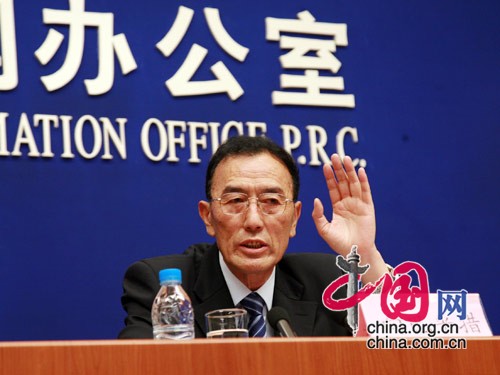The monks who spoke to foreign reporters in Johkang Temple during their Lhasa visit were not punished, said Qiangba Puncog, chairman of the Tibet regional government, in Beijing Wednesday.
"They are still in Johkang Temple and will be if they did not participate in any law-breaking activities such as beating, smashing, robbing and burning," Qiangba Puncog told a press conference.

As a country ruled by law, China will not punish anyone for expressing their opinions to the media, he said, "But if they commit any crime, it is another issue."
A group of monks disrupted a media briefing in the Jokhang Temple on March 27 when reporters from 19 media organizations including foreign ones paid a three-day visit to Lhasa after the unrest.
"I think it is natural for some people to have their own opinions and talk to the media," said Qiangba Puncog. "But what they said is not true."
Citing a monk claiming that the authority killed more than 100 people in Lhasa, he said that the monk himself later said he learned this from the Voice of America.
Most of the monks did not participate in violence but some not only took part but also were the leaders, he said. "Monks are also citizens. They will be punished if they break the law."
He denied the possibility of sending monks to centers of reeducation through labor. "The suspects will be taken to court and punished according to laws," he said.
The government actions after the unrest are targeting criminals instead of religious people or temples, said Sitar, deputy head of the United Front Work Department of the Central Committee of the Communist Party of China (CPC), at the same press conference.
"We have seen the religious circle, including many senior lamas in Tibet and other Tibetan-inhabited regions, speak out against the violence in Lhasa," he said. "They also denounced such activities as violating Buddhist teaching."
Meanwhile, Qiangba Puncog confirmed that some temples have not opened for free entry.
"It takes some time for Tibet to recover from the unrest, including aspects of its economic life such as tourism," he said. "We will pull it back on track as soon as possible."
Foreign reporters can still visit Tibet once they follow the legal procedures, he said.
"Foreigners and foreign media need to follow relevant regulations. We neither want to restrict media coverage nor have we anything to hide," he said.
(Xinhua News Agency April 9, 2008)